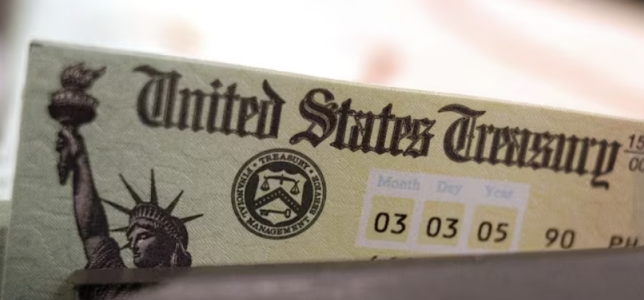Will your Social Security check shrink this June? Here’s what to know
By
Veronica E.
- Replies 1
If Social Security helps you cover the essentials, it’s worth giving your next check a closer look.
Starting this June, hundreds of thousands of older Americans could see a chunk of their benefits withheld as the government resumes collecting on overdue debts.
What’s going on, and how can you protect your income?
Let’s break it down.
A program called the Treasury Offset Program allows the federal government to collect on certain unpaid debts—like defaulted federal student loans—by reducing Social Security payments.
This practice was paused during the pandemic, but those protections ended in May 2024. Now, the collections are back.
If you're behind on federal student loans, the government can withhold up to 15% of your monthly check.
For someone receiving the average benefit of $1,976, that’s about $296—enough to throw off a tight budget.

Who’s at risk?
Roughly 450,000 Americans age 62 and older are currently in default, according to the Consumer Financial Protection Bureau.
That includes people who borrowed for their own education or took out loans to help children or grandchildren.
If your loans have been unpaid for 270 days or more, you could be affected.
What does this mean for your finances?
Losing part of your Social Security check can make it harder to afford essentials like food, medications, or rent.
And the consequences go beyond the monthly reduction.
Staying in default may also hurt your credit score, limit access to repayment help, and disqualify you from taking out future federal loans—for yourself or your family.
Also read: Retirees on edge with “real and growing” anxiety about Social Security
What can you do about it?
If you're at risk, don’t wait. Here are some steps to take now:
“First, reach out to your loan servicer. They can guide you through available options like deferment, forbearance, or creating a flexible repayment plan,” said Bethany Hubert, a financial aid specialist at Earnest.
“Programs like income-driven repayment can adjust your monthly payment to better match your budget.”
Also read: Don’t let these 3 surprising Social Security changes drain your retirement in 2025
What’s next in student loan policy?
Student loan collections from Social Security checks have sparked renewed calls for reform.
Advocacy groups want more protections for seniors, while some lawmakers are looking into simplifying repayment options and easing the burden on older borrowers.
Nothing is final yet—but public pressure is building.
Further changes may be on the horizon.
According to a proposal known as the One Big Beautiful Bill Act, passed by the House last month, the Trump administration is seeking to streamline repayment options.
Meanwhile, Education Secretary Linda McMahon acknowledged the need for broader reform, saying, “We must also fix a broken higher education finance system that has put upward pressure on tuition rates.”
If you’re in default on federal student loans, know this: you’re not alone, and there are ways to protect your benefits.
With the right information and support, you can take steps to avoid or stop garnishment—and keep your retirement on track.
Read next: Your Social Security payment didn’t arrive? Here’s what to do next

Have you been affected by student loan garnishments? Do you have advice for others navigating debt in retirement? Drop your thoughts in the comments—we’re in this together.
Starting this June, hundreds of thousands of older Americans could see a chunk of their benefits withheld as the government resumes collecting on overdue debts.
What’s going on, and how can you protect your income?
Let’s break it down.
A program called the Treasury Offset Program allows the federal government to collect on certain unpaid debts—like defaulted federal student loans—by reducing Social Security payments.
This practice was paused during the pandemic, but those protections ended in May 2024. Now, the collections are back.
If you're behind on federal student loans, the government can withhold up to 15% of your monthly check.
For someone receiving the average benefit of $1,976, that’s about $296—enough to throw off a tight budget.

Many seniors may see a dip in their Social Security checks this month as federal student loan collections resume. Image Source: YouTube / CBS News.
Who’s at risk?
Roughly 450,000 Americans age 62 and older are currently in default, according to the Consumer Financial Protection Bureau.
That includes people who borrowed for their own education or took out loans to help children or grandchildren.
If your loans have been unpaid for 270 days or more, you could be affected.
What does this mean for your finances?
Losing part of your Social Security check can make it harder to afford essentials like food, medications, or rent.
And the consequences go beyond the monthly reduction.
Staying in default may also hurt your credit score, limit access to repayment help, and disqualify you from taking out future federal loans—for yourself or your family.
Also read: Retirees on edge with “real and growing” anxiety about Social Security
What can you do about it?
If you're at risk, don’t wait. Here are some steps to take now:
- Contact your loan servicer to explore repayment options before garnishments start.
- Look into rehabilitation or consolidation to get out of default.
- Ask about income-driven repayment plans, which can lower payments based on your income—and even reduce them to $0.
- Seek help from nonprofit credit counselors or legal aid groups if you’re unsure where to start.
“First, reach out to your loan servicer. They can guide you through available options like deferment, forbearance, or creating a flexible repayment plan,” said Bethany Hubert, a financial aid specialist at Earnest.
“Programs like income-driven repayment can adjust your monthly payment to better match your budget.”
Also read: Don’t let these 3 surprising Social Security changes drain your retirement in 2025
What’s next in student loan policy?
Student loan collections from Social Security checks have sparked renewed calls for reform.
Advocacy groups want more protections for seniors, while some lawmakers are looking into simplifying repayment options and easing the burden on older borrowers.
Nothing is final yet—but public pressure is building.
Further changes may be on the horizon.
According to a proposal known as the One Big Beautiful Bill Act, passed by the House last month, the Trump administration is seeking to streamline repayment options.
Meanwhile, Education Secretary Linda McMahon acknowledged the need for broader reform, saying, “We must also fix a broken higher education finance system that has put upward pressure on tuition rates.”
If you’re in default on federal student loans, know this: you’re not alone, and there are ways to protect your benefits.
With the right information and support, you can take steps to avoid or stop garnishment—and keep your retirement on track.
Read next: Your Social Security payment didn’t arrive? Here’s what to do next
Key Takeaways
- Roughly 450,000 seniors could see their Social Security payments reduced by up to 15% due to student loan default.
- The Treasury Offset Program resumed collections on May 5 after a pandemic-related pause.
- Garnishment can also lead to the loss of financial aid options, forbearance eligibility, and a drop in credit scores.
- Borrowers should contact their loan servicer promptly to explore income-driven plans, deferment, or rehabilitation to stop garnishment.
Have you been affected by student loan garnishments? Do you have advice for others navigating debt in retirement? Drop your thoughts in the comments—we’re in this together.






